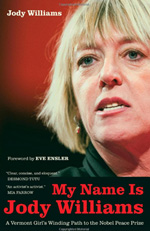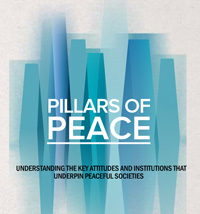RECOMMENDATIONS
More recommendations
-

My name is Jody Williams
Jody Williams is a fascinating individual. She's fascinating for any peace or human rights activist, but even more so for those of us who have researched disarmament campaigns in any depth such as the campaign to ban landmines. Our paths have crossed on many occasions, especially during the negotiation period for the treaty to prohibit cluster munitions. And, as other activists and diplomats can confirm, she is the kind of person who leaves a lasting impression on you.
That is exactly the impression you get from reading her biography. Written for a US reader, this extraordinarily charismatic girl from Vermont goes into detail once again in a self-critical work which she began with the publication of "Banning Landmines: Disarmament, Citizen Diplomacy, and Human Security". Even though Williams has written about the genesis and evolution of the campaign before, on this occasion she goes into much greater detail. In this regard, the author describes herself as the 'bad cop' to explain her role during the negotiations which would eventually lead to the prohibition of landmines.
From a sincere and mature perspective, the author shares anecdotes associated with her strong personality, evident when she describes disagreements or arguments not only in her role as an activist, but also in her intimate personal life. In fact, the true novelty in this new book really is the whole personal dimension of her life, including her tales of romance, probably of less interest to the reader in search of diplomacy and civil society issues, in which Jody Williams is a figure to be reckoned with. In this regard, the reader can find useful first-hand reflections on leadership and the different manners in which to lead.
Perhaps, the most interesting aspect of her life is the fact that during her final years at university, Jody Williams' political conscience was practically non-existent; and it was the university of Life, stemming from a curiosity to discover how the world beyond the mundane day-to-day life, actually worked. This desire would assist her in becoming one of the 100 most influential women in the world today. The bottom line; any one of us can become a Nobel Peace Prize winning activist. Or at least, that is the message that leaps out at you from the pages of this autobiography. X.A.
-

The Pillars of Peace
What factors make one society more peaceful than another? How can positive peace levels be measured?
The Institute for Economics and Peace recently published a report titled 'The Pillars of Peace', which provides a precise definition of the structures required to build a peaceful society, understanding peace as a state of social justice beyond a mere absence of violence.
It is these 8 pillars, 8 interdependent elements describing the optimal environment for peace to flourish: a well-functioning government (effective and close to the people), a sound business environment, an equitable distribution of resources, an acceptance of the rights of others, good relations with neighbours (individual, communities and nation states), free-flow of information, a high level of human capital, and low levels of corruption.
The report demonstrates how each of these factors has an impact on the others; they are interdependent, in such a way that the strength or fragility of each factor effects whether the other factors become stronger or weaker. For example, there is no doubt that the levels of corruption in a society are closely tied to the correct functioning of the government and the free-flow of information.
The study also demonstrates the association between resilience – the human capacity to overcome extreme situations and to adapt- and peace. Therefore, it is true to say that countries with higher levels of peace tend to be more resilient to external shocks, whether they are economic, geopolitical or natural disasters. Two recent examples of this can be seen in the respective recoveries in Iceland and Japan, one after the financial crisis and the other following the March 2011 earthquake and tsunami. E.R.
http://www.visionofhumanity.org/sites/default/files/Pillars%20of%20Peace%20Report%20IEP.pdf
-

Parliamentarians for Global Action- Acciˇn Mundial de Parlamentarios
Parliamentarians for Global Action (PGA) (http://www.pgaction.org/home.html) is a non-profit, non-partisan association established in 1978, with a network of over 1,000 legislators in approximately 130 elected parliaments. Initially, the driving force behind the association was the struggle for nuclear disarmament. Nevertheless, over time the list of issues has expanded to include fostering peace and democracy, the rule of law, human rights, and gender equality. In order to do this, the association strives to inform and mobilize legislators in order to progress in achieving these goals.
The two main programmes implemented by the association are that of International Law & Human Rights and Peace & Democracy. Under the framework of the latter, the PGA initiated a global parliamentary campaign for signature and ratification of the Arms Trade Treaty (ATT). The campaign boasts a wealth of material resources including a parliamentary Tool Kit to assist legislators in promoting signature and ratification of the treaty. It should be pointed out here that the guide includes a hands-on drafting of the ATT with Article-by-Article comments regarding how Parliamentarians can best assert their constitutionally bestowed prerogatives to satisfactorily discharge the responsibilities and promote adequate implementation, thereby representing an extremely useful parliamentary tool.
Before year-end in December, the association will hold the 35th session of the Annual Parliamentary Forum, to be held in Bogota, Colombia. The topic to be addressed is: "Building a stable and durable peace: the role of parliamentarians in support of peace processes".
-

Global conflict trends
The Center for Systemic Peace (http://www.systemicpeace.org/), founded in 1997, is engaged in research on the problem of political violence. The CSP supports quantitative research in areas related to violence. The center reports on general trends at global, regional and state levels. Included within the framework of its activities is the Global Conflict Trends initiative (http://www.systemicpeace.org/conflict.htm), which adopts a systematic approach in examining the general condition of peace in the global system.
The center's perspective on peace includes aspects such as income distribution, global trends in armed conflict (intra-state and inter-state), the number of states participating in any form of warfare, the number of deaths from political violence, the number of refugees and displaced populations, regime type by income, deaths from international terrorism and state fragility. All the aforementioned statistics attempt to collect the data from the middle of the past century up to the present time. In addition, to accessing graphs depicting this information, it is also possible to access data used to compile each graph and the technical specifications used to collect the data. All this information is available from their website.
The site also provides succinct data concerning some of the keys to current conflict trends. Among other factors, the trends that stand out include, the effects of armed conflict spreading to neighbouring countries and the importance of controlling black markets (drug trafficking, diamonds) where war is becoming increasingly privatized.